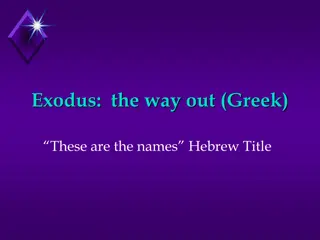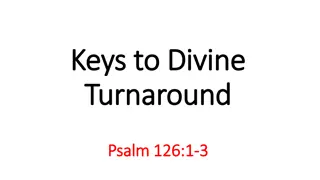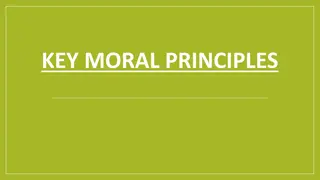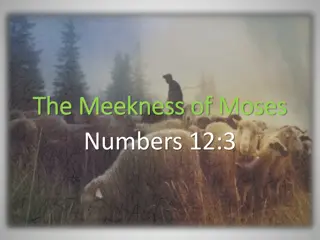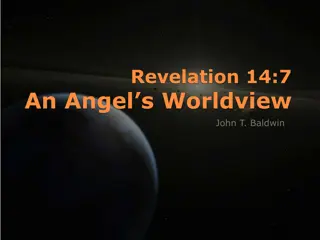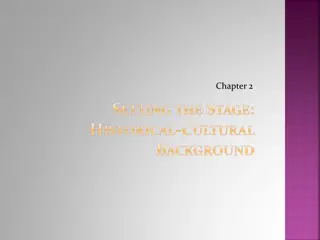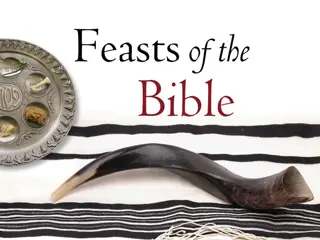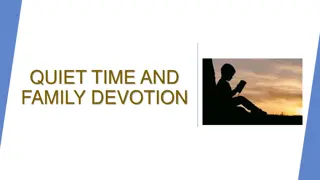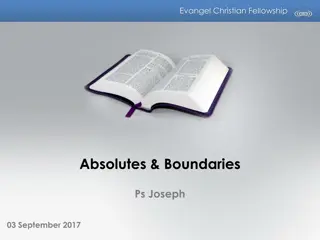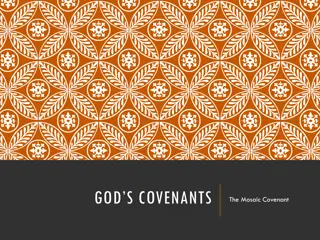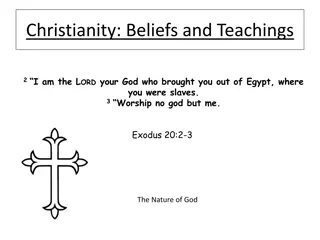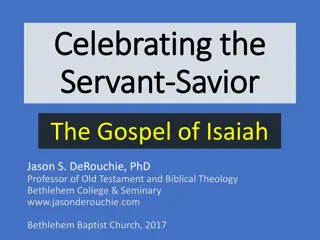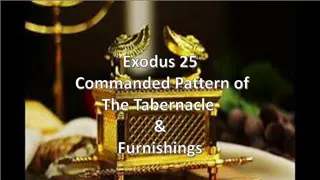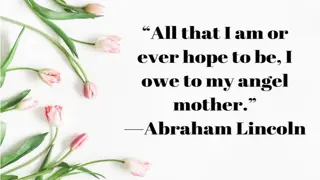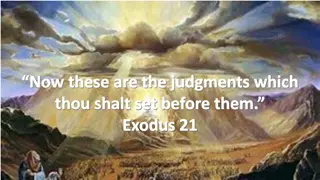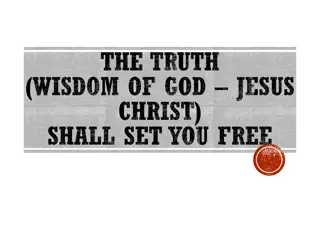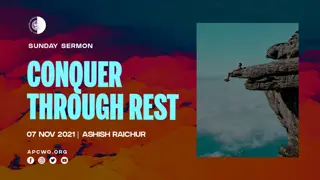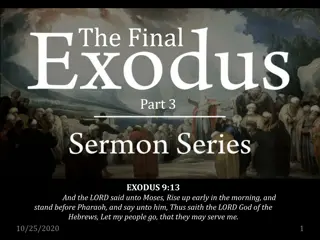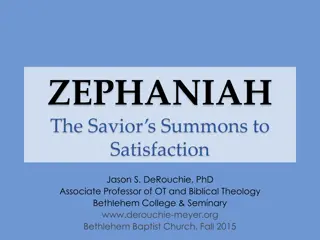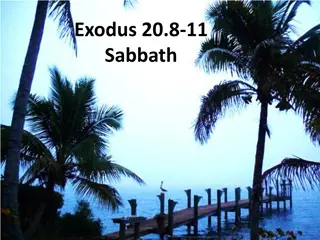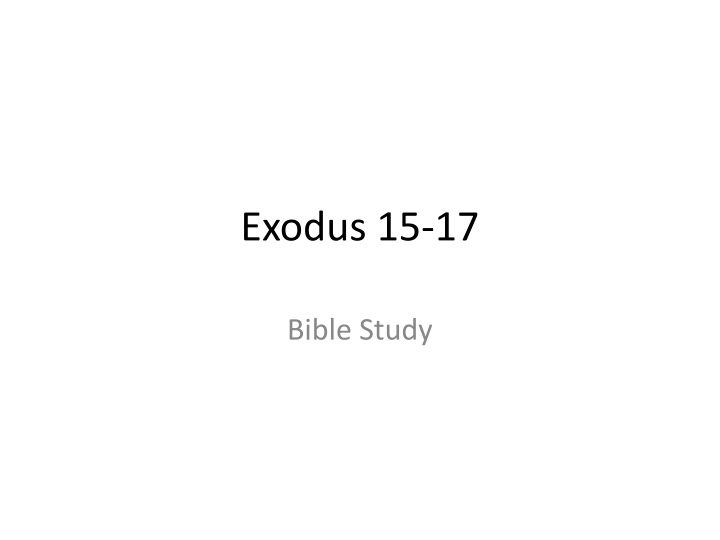
Exodus Chapter Summaries: Passover, Pillar of Cloud, Red Sea Crossing
Explore key events in Exodus chapters 12-15: God reveals the calendar, Passover instructions, Israel's journey, God's protection, Moses' song of praise, and God's victory over Pharaoh.
Download Presentation

Please find below an Image/Link to download the presentation.
The content on the website is provided AS IS for your information and personal use only. It may not be sold, licensed, or shared on other websites without obtaining consent from the author. If you encounter any issues during the download, it is possible that the publisher has removed the file from their server.
You are allowed to download the files provided on this website for personal or commercial use, subject to the condition that they are used lawfully. All files are the property of their respective owners.
The content on the website is provided AS IS for your information and personal use only. It may not be sold, licensed, or shared on other websites without obtaining consent from the author.
E N D
Presentation Transcript
Exodus 15-17 Bible Study
Review Chapter 12 God revealed his calendar to Israel and gave them instructions for Passover and Unleavened Bread Israel left Egypt after 430 years (rejoicing) Chapter 13 Israel instructed to set apart the firstborn (for service to God) Israel did not take the direct route to Canaan (along the Mediterranean) God accompanied Israel in a pillar of cloud, and pillar of fire by night Chapter 14 Pharaoh pursues Israel when he thinks they are boxed in at the Red Sea Israel was afraid and complained when they saw Pharaoh s army approaching God delivered them and destroyed Pharaoh s army Exodus 14:30-31 30So the Lord saved Israel that day out of the hand of the Egyptians, and Israel saw the Egyptians dead on the seashore. 31Thus Israel saw the great work which the Lord had done in Egypt; so the people feared the Lord, and believed the Lord and His servant Moses.
Moses and the Israelites sing a song of praise to God for their deliverance Composed by Moses 1st song of length in the Bible Chapter 15 1Then Moses and the children of Israel sang this song to the Lord, and spoke, saying: I will sing to the Lord, For He has triumphed gloriously! The horse and its rider He has thrown into the sea! (Companion) There was no singing in Egypt, only sighing and groaning (LASB) Music was an important part in Israel s worship and celebration and it was a creative way to pass down oral traditions. Some say this song of Moses is the oldest recorded song in the world (NSB) The Hebrew word for thrown is a rare and pictorial expression. It describes God as reaching down and tossing members of the Egyptian army into the water one by one 2 The Lordis my strength and song, And He has become my salvation; He is my God, and I will praise Him; My father s God, and I will exalt Him. v. 2 The Lord = (Heb. Jah) (Adam Clarke) the word which we translate Lord here is not Jehovah in the original, but Jah (Companion) The Lord = Heb. JAH the eternal, inhabiting eternity. The first occurrence of the title: connects it with redemption
3 The Lord is a man of war; The Lord is His name. The Lord is a man of war [Heb. Idiom] (JFB) Signifies a great warrior. Jehovah is poetically represented as a mighty champion The Lord is His name (NSB) It is difficult to exaggerate God s name in the Bible. Other supposed gods had secret names that only guilds of priests knew. By knowing a god s secret name, a priest supposedly had access to that god. But the living God has made His name known to all, and salvation is found in His name alone 4Pharaoh s chariots and his army He has cast into the sea; His chosen captains also are drowned in the Red Sea. 5 The depths have covered them; They sank to the bottom like a stone.
6Your right hand, O Lord, has become glorious in power; Your right hand, O Lord, has dashed the enemy in pieces. Your right hand (NSB) The Exodus narrative has emphasized the extended, powerful right hand of God throughout. This is a way of describing God s active presence among His people. 7 And in the greatness of Your excellence You have overthrown those who rose against You; You sent forth Your wrath; It consumed them like stubble. 8 And with the blast of Your nostrils The waters were gathered together; The floods stood upright like a heap; The depths congealed in the heart of the sea. v. 8 The powerful wind that made the waters pile up on either side of the people is described in poetry as a blast of Your nostrils 9The enemy said, I will pursue, I will overtake, I will divide the spoil; My desire shall be satisfied on them. I will draw my sword, My hand shall destroy them. 10 You blew with Your wind, The sea covered them; They sank like lead in the mighty waters. 11 Who is like You, O Lord, among the gods? Who is like You, glorious in holiness, Fearful in praises, doing wonders? 12 You stretched out Your right hand; The earth swallowed them. 13 You in Your mercy have led forth The people whom You have redeemed; You have guided them in Your strength To Your holy habitation.
14The people will hear and be afraid; Sorrow will take hold of the inhabitants of Philistia. 15 Then the chiefs of Edom will be dismayed; The mighty men of Moab, Trembling will take hold of them; All the inhabitants of Canaan will melt away. Reports of what had taken place in Egypt traveled to the surrounding nations 17 You will bring them in and plant them In the mountain of Your inheritance, In the place, O Lord, which You have made For Your own dwelling, The sanctuary, O Lord, which Your hands have established. You will bring them in and plant them (BKC) Moses triumphal song includes the assurance that God would bring His people into the promised land. Moses also affirmed the fact that the Lord will reign over His people forever what He will do in His eternal reign 18 The Lord shall reign forever and ever. 19For the horses of Pharaoh went with his chariots and his horsemen into the sea, and the Lord brought back the waters of the sea upon them. But the children of Israel went on dry land in the midst of the sea.
20Then Miriam the prophetess, the sister of Aaron, took the timbrel in her hand; and all the women went out after her with timbrels and with dances. 21And Miriam answered them: Sing to the Lord, For He has triumphed gloriously! The horse and its rider He has thrown into the sea! v. 20 Miriam the prophetess [Moses sister] (JFB) in this instance, principally from her being eminently skilled in music; and in this sense the word prophesy is sometimes used in scripture Northern part of the Sinai Peninsula 22So Moses brought Israel from the Red Sea; then they went out into the Wilderness of Shur. And they went three days in the wilderness and found no water. 23Now when they came to Marah, they could not drink the waters of Marah, for they were bitter. Therefore the name of it was called Marah. Marah= bitter 24And the people complained against Moses, saying, What shall we drink? (BKC) This recent response is amazing in light of their recent deliverance and triumphal songs of worship. They were so privileged; yet hardship quickly induced them to impugn Moses
25So he cried out to the Lord, and the Lord showed him a tree. When he cast it into the waters, the waters were made sweet. a tree (NSB) The use of a tree made the miracle of cleansing easier to perceive (BKC) The wood [tree] that Moses tossed in the water did not have a magical effect on the water; it was simply a symbolic act in anticipation of God s working a miracle This miracle taught Israel a lesson: he purified the waters despite their grumbling. God then made a covenant with Israel, that if they trusted and obeyed Him, God would be their healer There He made a statute and an ordinance for them, and there He tested them, 26and said, If you diligently heed the voice of the Lord your God and do what is right in His sight, give ear to His commandments and keep all His statutes, I will put none of the diseases on you which I have brought on the Egyptians. For I amthe Lord who heals you. (BKC) These diseases may refer to the plagues, or more likely, to boils common to the delta region of Egypt They had probably seen side effects from some of the plagues, and other sicknesses and diseases upon the Egyptians
v. 26 (last part) For I amthe Lord who heals you the Lord who heals you (Companion) Jehovah rophe eka One of the Jehovah titles [10]. The name Jehovah is combined with the other words which form what is known as the Jehovah Titles 27Then they came to Elim, where there were twelve wells of water and seventy palm trees; so they camped there by the waters. Elim= place of trees Welcome relief from the wilderness
Chapter 16 Israel s journey in the wilderness 1And they journeyed from Elim, and all the congregation of the children of Israel came to the Wilderness of Sin, which is between Elim and Sinai, on the fifteenth day of the second month after they departed from the land of Egypt. journeyed from Elim (Companion) The Egyptian kings of the 12th dynasty worked copper and turquoise mines in peninsula of Sinai old [were] roads left (Barnes) The journey from Elim at that time the route was kept in good condition by the Egyptians Wilderness of Sin = (Expositors) Sin may be derived from the Hebrew thorn bush (NSB) The name sin has nothing to do with the English word sin fifteenth day of the second month (Expositors) was exactly one month after Israel had left Egypt (JFB) the distance they had travelled in all did not exceed 100 miles
v.1 they journeyed from Elim came to the Wilderness of Sin.. Elim Wilderness of Sin (vast hostile environment)
2Then the whole congregation of the children of Israel complained against Moses and Aaron in the wilderness. 3And the children of Israel said to them, Oh, that we had died by the hand of the Lord in the land of Egypt, when we sat by the pots of meat and when we ate bread to the full! For you have brought us out into this wilderness to kill this whole assembly with hunger. v. 3 Oh, that we had died by the hand of the Lord in the land of Egypt (Barnes) This evidently refers to the plagues, especially the last: the death which befell the Egyptians appeared to the people preferrable to the sufferings of famine 4Then the Lord said to Moses, Behold, I will rain bread from heaven for you. And the people shall go out and gather a certain quota every day, that I may test them, whether they will walk in My law or not. test (NSB) The verb translated test (with God as subject) does not mean to tempt one to fail but to prove what one really is [15:25; 20:20) whether they will walk in My law or not (Expositors) is a clear reference to the fact that God held men accountable to his law even before it fuller revelation at Sinai
5And it shall be on the sixth day that they shall prepare what they bring in, and it shall be twice as much as they gather daily. Gathering and preparing twice as much on the sixth day to allow for rest on the Sabbath (Expositors) Already prior to the giving of the ten commandments, the seventh day was to be set apart for the Lord because of its establishment in the creation ordinances in Genesis 2: 2-3 6Then Moses and Aaron said to all the children of Israel, At evening you shall know that the Lord has brought you out of the land of Egypt. 7And in the morning you shall see the glory of the Lord; for He hears your complaints against the Lord. But what arewe, that you complain against us? v. 6 At evening . v. 7 in the morning God was telling them ahead of time the miracles he was yet to perform v. 7 see the glory of the Lord (NSB) They would have a renewed sense of God s presence and further evidence of God s mercy
8Also Moses said, This shall be seen when the Lord gives you meat to eat in the evening, and in the morning bread to the full; for the Lord hears your complaints which you make against Him. And what are we? Your complaints arenot against us but against the Lord. God glory would be seen when they have food in the evening and in the morning to prove that he had heard their complaining 9Then Moses spoke to Aaron, Say to all the congregation of the children of Israel, Come near before the Lord, for He has heard your complaints. Come near before the Lord (Expositors) illustrates one of the most important words in the theology of worship 10Now it came to pass, as Aaron spoke to the whole congregation of the children of Israel, that they looked toward the wilderness, and behold, the glory of the Lord appeared in the cloud. the glory of the Lord appeared in the cloud (Keil and Delitzch) i.e., in a flash of light bursting forth from the cloud, and revealing the majesty of God (NSB) One of the grand theophanies (appearance of God) recorded in Exodus. God first appeared to Moses in the burning bush
11And the Lord spoke to Moses, saying, 12 I have heard the complaints of the children of Israel. Speak to them, saying, At twilight you shall eat meat, and in the morning you shall be filled with bread. And you shall know that I am the Lord your God. at twilight = between the two evenings time before sunset and dark in the morning (BKC) The bread came early in the morning actually during the night Numbers 11:9 9And when the dew fell on the camp in the night, the manna fell on it. 13So it was that quails came up at evening and covered the camp, and in the morning the dew lay all around the camp. Quails (Old Testament Times, R K Harrison) Quails only land on the Mediterranean coast of the Sinai peninsula from Europe in the autumn and at dawn. By contrast, the hungry Israelites encountered them in the spring, in the evening, and during the month of March (Barnes) The miracle consisted in the precise time of the arrival and its coincidence with the announcement
14And when the layer of dew lifted, there, on the surface of the wilderness, was a small round substance, as fine as frost on the ground. 15So when the children of Israel saw it,they said to one another, What is it? For they did not know what it was.And Moses said to them, This is the bread which the Lord has given you to eat. (Expositors) manna= What is it? We agree with Rawlinson: manna must be regarded as a peculiar substance, miraculously created for a special purpose, but similar in certain respects to certain known substances which are still produced in the Sinai region (LASB) Manna appeared on the ground each day as thin flakes like frost. The people gathered it, ground it like grain, and made it into honey-tasting pancakes 16This is the thing which the Lord has commanded: Let every man gather it according to each one s need, one omer for each person, according to the number of persons; let every man take for those who arein his tent. (Zondervan Bible Backgrounds Commentary) the omer in earlier times was likely around 1.75 liters, almost 2 quarts There was enough manna for each person they were not to take more then each person needed
17Then the children of Israel did so and gathered, some more, some less. 18So when they measured it by omers, he who gathered much had nothing left over, and he who gathered little had no lack. Every man had gathered according to each one s need. v. 18 (Barnes) Whatever the quantity each person had gathered, when he measured it in his tent, he found that he had just as many omers as he needed for the consumption of his family 19And Moses said, Let no one leave any of it till morning. 19 (TEV) Moses said to them, No one is to keep any of it for tomorrow 20Notwithstanding they did not heed Moses. But some of them left part of it until morning, and it bred worms and stank. And Moses was angry with them. 20 (TEV) But some of them did not listen to Moses and saved part of it. The next morning it was full of worms and smelled rotten, and Moses was angry with them.
21So they gathered it every morning, every man according to his need. And when the sun became hot, it melted. 21 (TEV) Every morning each one gathered as much as he needed; and when the sun grew hot, what was left on the ground melted. (Expositors) In spite of his warning that God was testing [v.4] the people by ordering them not to leave any manna until the next morning, some paid no attention to Moses. This test was to remind Israel that they did not live by bread alone but by every word that comes from the mouth of the Lord. Furthermore, it taught Israel that even their daily bread was a gift from God; therefore they were to live in daily dependence upon him
22And so it was, on the sixth day, that they gathered twice as much bread, two omers for each one. And all the rulers of the congregation came and told Moses. (Keil and Delitzch) On the 6thday of the week the quantity yielded was twice as much the princes of Israel informed Moses of this (Barnes) twice as much bread From this passage and from [v.5] it is inferred that the seventh day was previously known to the people as a day separate from all others, and if so, it must have been observed as an ancient and primeval institution First mention of the Sabbath in Bible 23Then he said to them, This is whatthe Lord has said: Tomorrow is a Sabbath rest, a holy Sabbath to the Lord. Bake what you will bake today, and boil what you will boil; and lay up for yourselves all that remains, to be kept until morning. What the Lord has said (Matthew Poole) either to Moses by inspiration, or to the former Patriarchs upon like occasions: this practice is agreeable to the former word and law of God concerning the Sabbath (Adam Clarke) it is here spoken of as being perfectly well known, from its having been generally observed. The commandment, it is true, may be considered as being now renewed
(Expositors) The day of rest, a holy Sabbath to the Lord, did not originate with the Sinaitic legislation; for even in 20: 8-11 it was grounded in the ordinances of creation 2:2-3. The 7th day was to be a day of cessation or rest therefore, food preparations for the morrow were to be made on the 6thday (JFB) tomorrow is a Sabbath rest This is just the language which would naturally be employed by one who wished to remind his hearers of the morrow being cessation from their ordinary employments. it is quite appropriate, on the idea of his speaking to them respecting an ordinance with which they were familiarly acquainted. 24So they laid it up till morning, as Moses commanded; and it did not stink, nor were there any worms in it. 25Then Moses said, Eat that today, for today is a Sabbath to the Lord; today you will not find it in the field. 26Six days you shall gather it, but on the seventh day, the Sabbath, there will be none. (NSB) The characteristics of manna were a built-in reminder of the importance of the Sabbath day in the life of the people of Israel
27Now it happened that some of the people went out on the seventh day to gather, but they found none. 28And the Lord said to Moses, How long do you refuse to keep My commandments and My laws? 29See! For the Lord has given you the Sabbath; therefore He gives you on the sixth day bread for two days. Let every man remain in his place; let no man go out of his place on the seventh day. 30So the people rested on the seventh day. v. 28 How long do you refuse to keep My commandments and My laws? (JFB) language which, while it sufficiently attests the ungrateful and disobedient character of the Israelitish people, would not have been used in reference to an institution of recent origin let no man go out of his place on the 7thday (Barnes) they were not to go forth from their place to gather manna .the spirit of the law is sacred rest 31And the house of Israel called its name Manna. And it was like white coriander seed, and the taste of it was like wafers made with honey. 1st occurrence (Barnes) it was not indeed the common manna (Companion Bible) Seven characteristics: small , round [v.14] white, sweet [v.31] hard [Num. 11:8] melted [Num.14:9] from heaven daily [v.13]
32Then Moses said, This isthe thing which the Lord has commanded: Fill an omer with it, to be kept for your generations, that they may see the bread with which I fed you in the wilderness, when I brought you out of the land of Egypt. 33And Moses said to Aaron, Take a pot and put an omer of manna in it, and lay it up before the Lord, to be kept for your generations. (LASB) The Hebrews put some manna in a special jar as a reminder of the way God provided for them in the wilderness. And as a reminder of God s goodness for future generations 34As the Lord commanded Moses, so Aaron laid it up before the Testimony, to be kept. (BKC) The manna was to be placed in front of the testimony. The testimony refers to the two tablets of the law which were in the ark [of the covenant] of the testimony (Companion) the testimony = the ark, the ark not yet made Fig. Hysterologia a prior mention of a subsequent event 35And the children of Israel ate manna forty years, until they came to an inhabited land; they ate manna until they came to the border of the land of Canaan. 36Now an omer is one-tenth of an ephah.
Chapter 17 1Then all the congregation of the children of Israel set out on their journey from the Wilderness of Sin, according to the commandment of the Lord, and camped in Rephidim; but there was no water for the people to drink. (BKC) Rephidim was close to Sinai.. (BKC) They also camped at Dophkah and Alush before Rephidim [Num. 33:12-14] An oasis, but there was no water 2Therefore the people contended with Moses, and said, Give us water, that we may drink. So Moses said to them, Why do you contend with me? Why do you tempt the Lord? This was worse than their murmurings of distrust at Marah (BKC) They want to stone Moses [v.4] v. 2 contended can be in strife, contention or even litigation (Expositors) 3And the people thirsted there for water, and the people complained against Moses, and said, Why is it you have brought us up out of Egypt, to kill us and our children and our livestock with thirst?
v. 1 the children of Israel set out on their journey from the Wilderness of Sin ..and camped in Rephidim Rephidim
4So Moses cried out to the Lord, saying, What shall I do with this people? They are almost ready to stone me! 5And the Lord said to Moses, Go on before the people, and take with you some of the elders of Israel. Also take in your hand your rod with which you struck the river, and go. 6Behold, I will stand before you there on the rock in Horeb; and you shall strike the rock, and water will come out of it, that the people may drink. And Moses did so in the sight of the elders of Israel. God provided water for them by means of another miracle Moses used the same rod he struck the Nile River in the 1st plague 7So he called the name of the place Massah and Meribah, because of the contention of the children of Israel, and because they tempted the Lord, saying, Is the Lord among us or not? Meribah= Massah= testing quarreling/contention is the Lord among us or not? a ridiculous and outrageous question after all of the miracles they had witnessed
8Now Amalek came and fought with Israel in Rephidim. The attack occurred about 2 months after the Exodus the Amalekites were at that time the most powerful people in the peninsula (Barnes) Amalek= Amalekites Descendents of Esau through Eliphaz [Gen. 36:12 Distant cousins of Israelites Apparently they wanted to dislodge Israel from the oasis at Rephidim and block any further territorial progress 1st time mentioned 9And Moses said to Joshua, Choose us some men and go out, fight with Amalek. Tomorrow I will stand on the top of the hill with the rod of God in my hand. rod of God a symbol of power; holding it was a sign of dependence and trust in God (BKC) 10So Joshua did as Moses said to him, and fought with Amalek. And Moses, Aaron, and Hur went up to the top of the hill. Hur an associate of Moses and Aaron Josephus says he was the husband of Miriam
11And so it was, when Moses held up his hand, that Israel prevailed; and when he let down his hand, Amalek prevailed. 12But Moses hands became heavy; so they took a stone and put it under him, and he sat on it. And Aaron and Hur supported his hands, one on one side, and the other on the other side; and his hands were steady until the going down of the sun. 13So Joshua defeated Amalek and his people with the edge of the sword. (BKC) Moses holding the staff of God above his head with both hands symbolized Israel s total dependence on the power of God 14Then the Lord said to Moses, Write this for a memorial in the book and recount it in the hearing of Joshua, that I will utterly blot out the remembrance of Amalek from under heaven. Deuteronomy 25:17-19 17 Remember what Amalek did to you on the way as you were coming out of Egypt, 18how he met you on the way and attacked your rear ranks, all the stragglers at your rear, when you were tired and weary; and he did not fear God. 19Therefore it shall be, when the Lord your God has given you rest from your enemies all around, in the land which the Lord your God is giving you to possess as an inheritance, that you will blot out the remembrance of Amalek from under heaven. You shall not forget.
14 (repeated) Then the Lord said to Moses, Write this for a memorial in the book and recount it in the hearing of Joshua, that I will utterly blot out the remembrance of Amalek from under heaven. (BKC) verse 14 includes the 1st mention in the Bible of official records, though Moses did keep some type of diary of the sojourn [Num. 33:2] blot out the remembrance of Amalek carried out in part by King Saul [I Sam. 15:18] and in the days of Hezekiah [I Chron. 4: 41-43] The ultimate fulfillment at the return of Jesus Christ [Obadiah 18] (Barnes) The meaning is evidently that the name of Jehovah is the true banner under which victory is certain 15And Moses built an altar and called its name, The-Lord-Is-My-Banner; Jah 16for he said, Because the Lord has sworn: the Lord will have war with Amalek from generation to generation. the Lord will have war with Amalek from generation to generation Amalek has been a persistent enemy of Israel throughout history even to our day and time
Lessons God made a covenant with Israel that if they trusted in him he would be their healer God wants us to be healthy and is our healer (James 5:14-15) James 5:14-15 14Is anyone among you sick? Let him call for the elders of the church, and let them pray over him, anointing him with oil in the name of the Lord. 15And the prayer of faith will save the sick, and the Lord will raise him up. And if he has committed sins, he will be forgiven. The bread from heaven manna was a physical type of the true bread from heaven, Jesus Christ As the manna gave Israel physical nourishment Christ gives us spiritual nourishment Israel continued time and again to forget God s miracles and complained bitterly yet God was with them and continued to provide for them When faced with trials we must remember God is there for us

